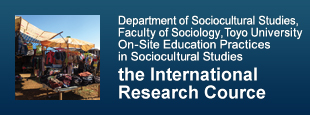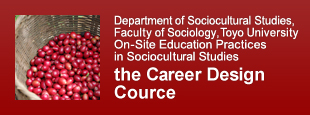- English
- Japanese
This department has set an educational goal of “developing students who will contribute to society with global perspectives”. In order to achieve this, we’ve tried to “improve practical education”; that students proactively visit “actual sites” in Japan as well as overseas and interact with locals, NPO, companies, and other organizations while studying sociology, anthropology, language and theory of regional research. In addition, several educational activities have been set up for students to acquire further practical ability to think independently and take actions.
Based on those educational activities, the module “On-Site Education Practices in Sociocultural Studies” has begun. It has students go outside the university to visit “actual sites” and learn through activities while comprehensively using the knowledge they acquired from university education. Students independently try to find and assess problems that are happening in society and further improve their problem-solving skills. The module aims at cultivating students who can “think outside the box” and seek to cooperate with regions as well as contributing to society with innovative ideas. Furthermore, since a sustainable project is the fundamental key of the activities, students strive to cultivate their communication skills through activities that they, and locals work together on. It also pursues the goal of developing practical, self-initiative students who have organizational ability.
In this module, students continuously participate in a project for over 2 years. They try to understand issues that are happening in local society through their research and study. Also, they strive to contribute to society by cultivating “problem-solving skills” and use these as experience for their career development. The module consists of the following three fields to fulfil each specific objective. Regardless of the field, the aim is to sustainably develop the project activities, build the lasting trust with the local society and organizations, and ensure region cooperation and contribution to society.
Students who have studied this module (= “On-Site Education Practices in Sociocultural Studies 1A-2B”) for more than 6 months, submitted a plan document and received guidance are allowed to engage in a related activity outside university in Japan or overseas (= conducted as “On-Site Education Special Practices in Sociocultural Studies” or “On-Site Education Special Research in Sociocultural Studies”).
1. The International Research Course through fieldwork (Course 1)
Students aim to consider and understand how our life is linked to the world by fieldwork and research on-site in both local communities and overseas.
【* e.g. Conduct research on the state of globalization through goods such as second-hand clothes and 100 yen shops.】
2. The Service Learning Course(Course 2)
Students assess the characteristics of a service to society that local communities are seeking and carry out appropriate activities suited for said communities. 【*e.g. Support for children in Fukushima, support for children whose background is overseas (Service-Learning Activities) 】
3. The Career Design Course(Course 3)
Students obtain work experience and consider their future career choices and returning what they’ve acquired to society. Conduct activities in society organizations such as companies and NPO’s.
【* e.g. Engage in fair trade, participate in internships】
→ “Service-Learning Activities” in this department is an educational program which students make efforts into specifically and practically using what they’ve learned on the department program (through internships and social contribution activities). This in turn gives the students expanded future career options and the ability to grow up and become an asset to society.
Modules
- On-Site Education Practices in Sociocultural Studies(1 semester/2 credits) Students participate in a project and continuously conduct activities.
- On-Site Education Special Practices in Sociocultural Studies(1 semester/2 credits) Individual on-site student activities outside the university (* this course is not held on university grounds.)
- On-Site Education Special Research in Sociocultural Studies(1 semester/2 credits) Students research and report on the activities in parallel with On-Site Education Special Practices in Sociocultural Studies.
Details of Modules
- On-Site Education Practices in Sociocultural Studies 1A (2 credits) for second year students and above (first year of practices)/spring semester(1 semester)
- On-Site Education Practices in Sociocultural Studies 1B(2 credits) for second year students and above(first year of practices)/fall semester (1 semester)
- On-Site Education Practices in Sociocultural Studies 2A (2 credits) for third year students and above who have completed Practices 1(second year of practices) /spring semester (1 semester)
- On-Site Education Practices in Sociocultural Studies 2B(2 credits) for third year students and above who have completed Practices 1/fall semester (1 semester)
- On-Site Education Special Practices in Sociocultural Studies A(2 credits)
and On-Site Education Special Research in Sociocultural Studies A(2 credits) for third students and above/spring semester (1 semester) - On-Site Education Special Practices in Sociocultural Studies B(2 credits)
and On-Site Education Special Research in Sociocultural Studies B(2 credits) for second year students and above/fall semester (1 semester)
* Students must take “Special Practices” and “Special Research” together as a set.
Credits for “Practices 1″ are necessary for taking “Special Practices”.
Note
- Students are allowed to take 1 (2 credits) to 4 (8 credits) “Practices”. However, if they wish to take more than 2 “Practices”, each title of the module must be different.
- Students who have completed 1 module (2 credits) are allowed to take “Special Practices/Special Research”.
- Students must take “Special Practices” and “Special Research” as a set in the same semester.
- Students are allowed to take 1 set (2 modules/4 credits) of “Special Practices” and “Special Research”, or 2 sets of modules under different titles (A/B) ( 4 modules/8 credits).
- Students are allowed to take up to 12 credits combining “Practices”, “Special Practices” and “Special Research”.
Examples of Schedule
| No. | Second Year, Spring |
Second Year, Fall |
Third Year, Spring |
Credits acquired |
Remarks |
|---|---|---|---|---|---|
| 1 | Practices 1A 2credits | Practices 1B 2credits | Special Practices ResearchA 4credits |
12credits | |
| 2 | Practices 1A 2credits | Special Practices ResearchB 4credits |
Special Practices ResearchA 4credits |
12credits | |
| 3 | Practices 1A 2credits | Special Practices ResearchB 4credits |
Practices 2A 2credits | 10credits | |
| 4 | Practices 1A 2credits | Practices 1B 2credits | Practices 2A 2credits | 8credits | No Special Practices/ Research |
| 5 | Practices 1A 2credits | 8credits | No Special Practices/ Research |
| No. | Third Year, Fall |
Final Year, Spring |
Final Year, Fall |
Credits acquired |
Remarks |
|---|---|---|---|---|---|
| 1 | Practices 2B 2credits | Practices 2A 2credits | 12credits | ||
| 2 | Practices 2B 2credits | 12credits | |||
| 3 | Practices 2B 2credits | 10credits | |||
| 4 | Practices 2B 2credits | 8credits | No Special Practices/ Research | ||
| 5 | Practices 1B 2credits | Practices 2A 2credits | Practices 2B 2credits | 8credits | No Special Practices/ Research |
“Practices”
…“On-Site Education Practices in Sociocultural Studies”
“Special Practices Research”
…“On-Site Education Special Practices in Sociocultural Studies” and “On-Site Education Special Research in Sociocultural Studies






